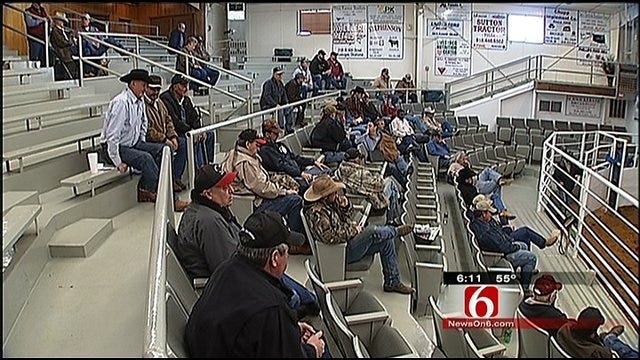Oklahoma Sale Barns Setting Record Prices For Cattle
Supply and demand is fueling a spike in cattle prices at sales barns. But with the cost of feed and the drought, ranchers aren't seeing the profit margins they'd like.Monday, January 23rd 2012, 5:09 pm
The highest prices for beef on record are showing up at sale barns all across Oklahoma.
Like many livestock auctions in Oklahoma, the Tulsa Stockyards has been busy. Many ranchers are selling cattle, because the price is sky high.
"I've never seen cattle that high, ever," said Joe Don Eaves, Tulsa Stockyards owner.
Tulsa Stockyards owner Joe Don Eaves says some cattle are going for 30 percent more per pound than last year.
"It's amazing what some of these cattle are bringing," he said.
Supply and demand is fueling the spike in prices. Eaves says the overall number of cattle in the U.S. is the lowest it's been since the 1950s.
It's mainly because of the drought in Oklahoma and several other big cattle producing states. Because of the hot, dry weather, the supply of cattle is low.
But consumer demand for beef is growing, especially in foreign markets like Japan, South Korea, and Mexico.
"There's more appetite than there are cattle right now," Eaves said.
So prices are high, and sales are booming. But it doesn't necessarily mean ranchers are raking in the profits.
"They're making money. But not as much as everybody thinks because expenses just got out of hand this year," said Joe Don Eaves, Tulsa Stockyards.
Many ranchers already had to get rid of some of their cattle this summer, because of the drought. Others limped through the brutal span of weather, but profit margins are suffering because of high costs.
"I hear of hay going for $75, $80 dollars a bail, or more even. You know, when you go to buying hay and paying that kind of price for it, it really cuts into the profit, and feed is higher than I've ever seen it," he said.
If cattle prices weren't as high as they are now, many ranchers would really be in trouble. But, for now, many are taking advantage of the increased prices while demand is high, and hoping 2012 is a year with much better weather.
Here's the downside of the high prices: we're all going to likely pay more for beef at the grocery store.
Also, many ranchers who are selling off much of their herds will have to pay higher prices for replacement cattle this spring.
More Like This
January 23rd, 2012
September 29th, 2024
September 17th, 2024
Top Headlines
December 13th, 2024
December 13th, 2024
December 13th, 2024
December 13th, 2024












